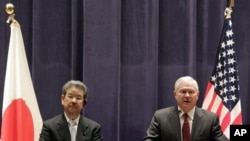U.S. Defense Secretary Robert Gates says in spite of concerns that China's civilian leaders did not know about a key military test this week, he is confident that they have full control of the People's Liberation Army, which includes the country's naval and air forces.
When China made the first test flight of its new radar-evading fighter jet Tuesday during Secretary Gates' visit to Beijing, U.S. officials were concerned that the country's civilian leaders, including President Hu Jintao, showed surprise when Secretary Gates asked about it.
But in Tokyo Friday, Secretary Gates said while the apparent "disconnect" over that and other recent military issues is "a worry," the problems could be what he called "bureaucratic mistakes," resulting from military units taking action without realizing the foreign policy implications. He said the same kind of thing happens in the United States.
"I don't question the (Communist) Party's control of the PLA. I have not doubts President Hu Jintao is in command and in charge. But I just know from our own system that at times there are disconnects between military information flowing to our civilian leaders," he said.
Gates said the United States would like Chinese leaders to close their communication gap with their military, but he said that is an internal Chinese matter.
He said the United States and China can cooperate on many matters, including defense, but the United States will not compromise on key interests, including free navigation of international waters. China has a different view, and has been trying to assert its claim to exclusive use of its 200-mile economic zone by intimidating foreign ships and engaging in sharp rhetoric.
Speaking at Tokyo's Keio University Friday, the defense secretary put the U.S.-Japanese defense alliance in the context of the growth of China's military.
"Advances by the Chinese military in cyber and anti-satellite warfare pose a potential challenge to the ability of our forces to operate and communicate in this part of the Pacific," he said.
Gates said a cyber attack could inflict enormous damage, but that the United States and Japan "maintain a qualitative edge in satellite and computer technology," and are working on ways to counter cyber and outer space threats.
Referring to China's advances and North Korea's provocative behavior, Gates said the U.S.-Japanese alliance is more important than ever. And while he recognized Japan's expanded involvement in international peacekeeping and disaster relief, and the limitations of its post-World War Two constitution, he urged the Japanese to do all they can to contribute to their own American-guaranteed security and to help address global security challenges.
"It will be important for Japan to take on even greater regional and global leadership roles that reflect its political, economic and military capacity," he said.
Gates said the United States needs a "capable and committed security partner in Japan."




